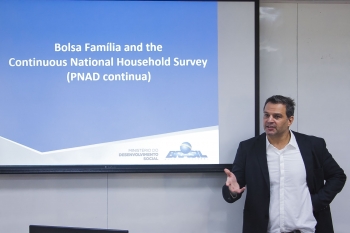FGV Social - Center for Social Policy held a workshop on Bolsa Família [Family Allowance], Targeting, and the Job Market. The event featured a lecture by Tiago Falcão, Income and Citizenship Secretary of the Brazilian Ministry of Social Development (MDS), who has been in charge of managing the Single Social Register (CadÚnico) for the last seven years. The event was attended by a select group of researchers from FGV’s Brazilian School of Public and Business Administration (EBAPE), Brazilian School of Economics and Finance (EPGE), Brazilian Institute of Economics (IBRE), and Center for Regulation and Infrastructure Studies (CERI), as well as Ipea representatives and public managers.
Throughout the presentation, the motivation of the public was to identify possible quasi-experiments to test the impacts of the program. Another goal was to improve the policy design and implementation platform based on publications developed at FGV. FGV Social has implemented public policies based on CadÚnico across all three levels of government in Brazil (municipal, state, and federal).
In the first part of the workshop, the MDS Secretary explored in detail the informational possibilities of CadÚnico.
“The Single Register is the main initiative in recent years in terms of implementing social policies in Brazil. Sixty percent of the Brazilian population wasn’t registered in any federal administrative register. The Single Register allows us to more accurately map the poorest and most vulnerable part of the population. All public policies directed to the poor can use this register as a reference. The Register was used initially only for Bolsa Família and today more than 20 federal programs use it as reference”, he said.
Falcão also pointed out the importance of the Bolsa Família Program. According to him, Bolsa Família has many results and analyses showcase its ability to change people’s lives.
“Despite the low cost of the program (less than 0.5% of the GDP), it currently reaches 14 million families”. Tiago Falcão also brought first-hand data pertaining to the review to discuss the latest findings on poverty and inequality through the Bolsa Família Program, based on the new possibilities offered by the Continuous PNAD.
The Bolsa Família Program has already been the topic of a seminar organized by FGV Social: “Poverty Reduction, Inclusive Growth and the New Social Agenda” with Minister Tereza Campello from the Brazilian Ministry of Social Development, and the Minister of Social Assistance from the FHC administration, Wanda Engel. The seminar shared insights from some of the main players in implementing policies against poverty, and fostered a discussion on what has happened since the turn of the millennium – with the spreading of new-generation programs nationwide, such as Bolsa Escola [School Allowance] and Bolsa Família.
Check out the workshop materials on the website.





